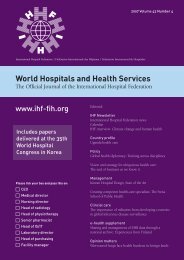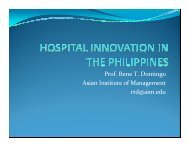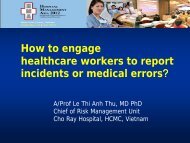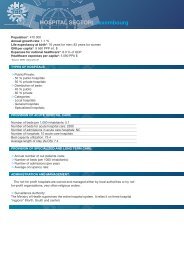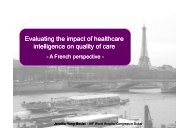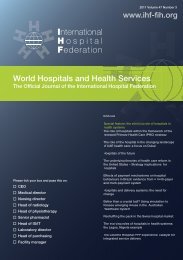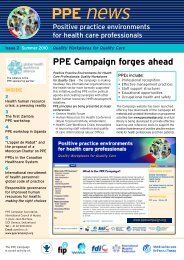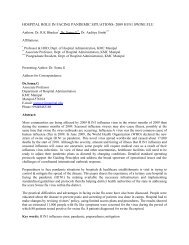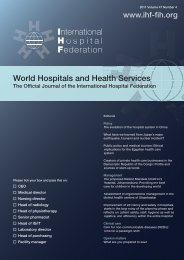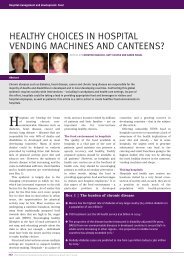World Hospitals and Health Services - International Hospital ...
World Hospitals and Health Services - International Hospital ...
World Hospitals and Health Services - International Hospital ...
You also want an ePaper? Increase the reach of your titles
YUMPU automatically turns print PDFs into web optimized ePapers that Google loves.
CLINICAL CARE: EMERGENCY SURGERY<br />
Organization should:<br />
1. Support Ministry of <strong>Health</strong>, Mongolia in the<br />
implementation of national policies, guidelines <strong>and</strong> plans<br />
to link the essential emergency <strong>and</strong> surgical care projects<br />
with disaster planning, HIV, trauma, maternal <strong>and</strong> child<br />
health projects.<br />
2. Make WHO training manual Surgical Care at the District<br />
<strong>Hospital</strong> <strong>and</strong> other training materials adapted to needs of<br />
Mongolia to facilitate their wider use.<br />
3. Support the Ministry of <strong>Health</strong> in national initiatives to<br />
promote emergency <strong>and</strong> essential surgical care.<br />
4. Support professional associations involvement in<br />
promoting essential surgical skills.<br />
5. Plan <strong>and</strong> implement follow-up activities.<br />
6. Support research on outcome <strong>and</strong> public health impact<br />
of emergency <strong>and</strong> essential surgical care.<br />
Partnerships<br />
Participants found that the role of partnership is essential in<br />
supporting national initiatives to promote essential<br />
emergency <strong>and</strong> surgical care through training <strong>and</strong> education<br />
of health personnel in the prevention of HIV transmission<br />
<strong>and</strong> other infectious agents through:<br />
1. Implementation of best practice guidelines <strong>and</strong><br />
education.<br />
2. Training in the use of universal precautions.<br />
3. Reduce unnecessary blood transfusions particularly in<br />
essential emergency <strong>and</strong> surgical procedures – in<br />
particular trauma <strong>and</strong> pregnancy related complications<br />
through the following:<br />
➜ reducing blood loss using surgical <strong>and</strong><br />
anaesthetic techniques;<br />
➜ assessment <strong>and</strong> treatment of anaemia;<br />
➜ use of intravenous fluids.<br />
Evaluation <strong>and</strong> follow up<br />
At the end of the training workshop an evaluation was done,<br />
using the WHO training workshop evaluation tool<br />
(translated in Mongolian). The participants scored their<br />
opinions <strong>and</strong> gave comments on the training contents,<br />
presentations, training tools (training manual Surgical Care at<br />
the District <strong>Hospital</strong>, e-learning tools, best practice protocols),<br />
duration <strong>and</strong> their confidence to teach basic skills following<br />
this training workshop. The average mean score was 4.83 on<br />
a scale of 1 to 5.<br />
A decision was made that monitoring <strong>and</strong> evaluation to<br />
assess the impact of the trainers workshop at each of the six<br />
aimag will be organised by the ‘Multidisciplinary Working<br />
Group’, six months following this training workshop, using<br />
the WHO needs assessment tools.<br />
Conclusions<br />
In the closing session, the Ms G<strong>and</strong>hi, the Minister of<br />
<strong>Health</strong>, was pleased that the e-learning was introduced in<br />
this training workshop <strong>and</strong> emphasised the need for training<br />
in basic skills to manage trauma <strong>and</strong> pregnancy-related<br />
complications, as the incidence of road traffic injury, post<br />
operative complications, burns in children, falls from<br />
horseback <strong>and</strong> frostbites was rising in Mongolia.<br />
Considering the difficulties in resources, geographical<br />
situation, long distances for referrals in between soum,<br />
intersoums <strong>and</strong> aimag hospitals, the participants reiterated<br />
that this project has enormous potential to fulfil the need of<br />
training health providers in the management of emergency<br />
procedures in trauma, pregnancy-related complications <strong>and</strong><br />
anaesthesia. ❑<br />
Vol. 40 No. 4 | <strong>World</strong> <strong><strong>Hospital</strong>s</strong> <strong>and</strong> <strong>Health</strong> <strong>Services</strong> | 29



